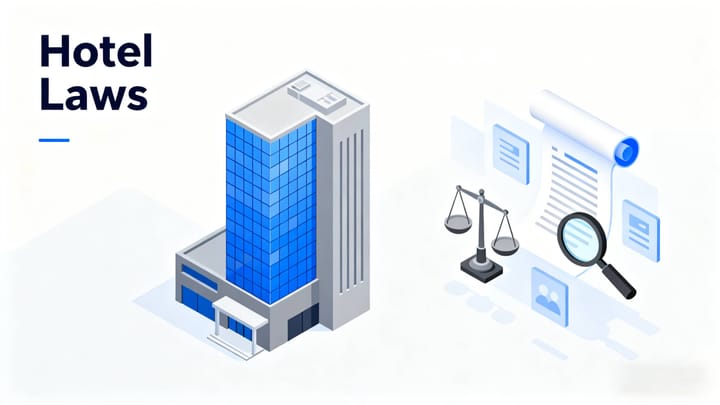Running a hotel means juggling many roles. You’re a host, manager, problem-solver, and marketer all at once. With so much to handle, it’s easy to push legal compliance aside. But ignoring the law isn’t an option.
The legal foundation of your business is just as important as the comfortable beds and sparkling clean rooms you provide. It’s what protects you, your staff, and every single guest who walks through your door. Think of this guide not as a list of rules to fear, but as a roadmap to building a resilient, respected, and successful business. Understanding hotel law is about gaining peace of mind and creating a truly safe haven for your guests.
Why Hotel Laws Matter
For many hotel managers, legal compliance feels like a pain—just another chore that eats up precious time. But it’s way more than that. The rules for your hotel aren’t just about avoiding fines. They are the backbone of a safe and trustworthy operation. When you follow the law, you're not just checking a box; you're building trust.
- Guests feel secure knowing their stay is backed by strict safety and privacy standards.
- Your staff feels protected by clear labor laws and safe working conditions.
A single legal misstep, a forgotten fire safety inspection, or a data breach can unravel years of hard work. The potential costs are staggering, from expensive lawsuits and crippling fines to a public relations nightmare that can shatter your reputation overnight. A strong legal foundation is the difference between a thriving business and one that’s constantly fighting fires, both literally and figuratively.
Core Hotel Laws to Know
The world of hotel law is vast, but you don't need to be a lawyer to understand the key areas that affect your daily operations. Knowing the basics gives you the power to make smart decisions and ask the right questions.
Guest Data and Privacy
These days, guests hand over their private info to you—credit cards, phone numbers, everything. Rules like Europe’s GDPR and PCI DSS aren’t just for tech giants. They apply to your hotel too.
These laws tell you how to handle guest data safely:
- Collect it carefully
- Store it securely
- Protect it tightly
Use a trusted Property Management System (PMS) to manage guest info. Teach your team how to keep data safe. And never write down a guest’s credit card number on paper.
One data breach can cause real harm—big fines and a ruined reputation. It’s not worth the risk.
Health and Safety Regulations
Your first priority is always the safety of your guests and staff. This starts with a deep commitment to health and safety laws. Fire codes are non-negotiable. You need to:
- Check smoke detectors often
- Keep fire extinguishers working and easy to grab
- Make sure all emergency exits are clear and marked well
If your hotel has a kitchen or serves food, food safety is just as big a deal. Your team needs proper training, and you’ve got to keep things super clean. Health inspectors visit regularly, and passing with flying colors shows you truly care about keeping people healthy.
Accessibility and Anti-Discrimination
Your hotel should welcome everyone. Laws like the ADA say you need rooms that work for wheelchairs—think roll-in showers and grab bars. Your lobby, restaurant, and pool areas need to be easy for anyone to get around too.
It’s not just about physical access. You can’t treat guests differently because of their race, religion, gender, or who they love. Train your team to help all guests with respect. That’s how you run a hotel that truly includes everyone.
Cancellation and Refund Policies
When dealing with guests, you need to follow some basic legal rules. Your cancellation and refund policies should be crystal clear. Guests must see these rules before they book—no surprises later.
Evicting a guest is another area where you need to be careful. You can’t just kick someone out because you don’t like them. You need a good legal reason, like:
- They haven’t paid
- They’re causing serious trouble
- They’re doing something illegal on your property
You’ve got to know both your rights and the guest’s rights in these situations. That’s how you keep things running smoothly and avoid lawsuits.
Employment and Labor Laws
Your staff are the heart of your hotel, and the law protects them. You need to follow rules about:
- Paying at least minimum wage
- Overtime pay
- Safe working conditions
- Treating everyone fairly (no discrimination)
Mess this up, and you could face expensive lawsuits or lose good employees.
Consumer Protection Laws
Guests have the right to know exactly what they’re paying for. Be upfront about:
- All prices (including taxes and fees)
- Cancellation rules
- What services you actually provide
Don’t hide fees or mislead people. Breaking these rules can get you in legal trouble and hurt your reputation.
Regional Hotel Laws
United States
- California: Hotels must train staff to spot human trafficking (free state training available). Resort fees must be shown in the advertised room rate.
- Florida: Hotels should maintain hurricane preparedness plans and provide evacuation guidance. The DBPR inspects hotels regularly, with frequency based on risk, not a fixed monthly schedule.
- Texas: Guests under 30 days can usually be removed without court action. If a guest establishes residency (e.g., mail delivery), formal eviction through the courts is required.
European Union
- General: GDPR applies to all hotels handling EU residents’ data. Food service must follow HACCP-based safety standards.
- Room Size: Set by each country (e.g., Italy often requires 9m² for singles).
- France: Restaurants must provide free tap water; no law requires bottled water in hotel rooms.
Asia-Pacific (APAC)
- India: Alcohol service requires a state excise license. Hotels must follow food safety and hygiene rules; linen changes are best practice, not a WHO mandate.
- Singapore: Hotels need licenses from STB and NEA, with inspections based on risk level. No-show fees are allowed only if disclosed at booking.
How Hotel Managers Can Stay Compliant
Staying on the right side of the law doesn't have to be a daunting task. It’s a matter of building smart, practical habits and using the right tools.
Create a Compliance Checklist
Turn abstract laws into an actionable checklist. Break down your legal obligations into simple, manageable tasks. Include things like:
- Monthly fire extinguisher checks.
- Quarterly staff data privacy training.
- Annual review of your cancellation policy.
- Regular inspections of guest rooms and common areas for safety hazards.
- Checking permits and licenses for renewal dates. This checklist transforms a complex topic into a routine part of your operations.
Embrace Technology
Modern technology can really help with compliance. A good Property Management System (PMS) protects guest data, handles routine tasks automatically, and keeps clear records of your business operations. Electronic maintenance logs, check-in details, and payment records are much more dependable than paper files. You’ll want software built to meet industry compliance standards.
Empower Your Team
Compliance isn’t a one-person job. Your staff deals with guests every day, so they need to be your biggest help in running things legally. Hold regular, hands-on training sessions. Don’t just show them legal papers—use real examples. Teach them how to handle a guest asking for their data, or what to do when the fire alarm sounds. When your team knows why a rule matters, they’re more likely to follow it.
Build Professional Relationships
Don't wait for problems to arise. Be proactive. Get to know your local fire marshal and health inspector. They are often willing to answer questions and provide guidance before an official inspection. Having an experienced lawyer who specializes in hospitality law can be an invaluable asset, especially when navigating complex situations or creating new policies.
Conclusion
Navigating the world of hotel laws might seem overwhelming, but it is a fundamental part of your job. It's not about being a legal expert; it's about being a responsible, knowledgeable business leader. The time and effort you invest in understanding and implementing these laws will pay off tenfold. It will lead to safer guests, happier staff, and a reputation for reliability that sets you apart from the competition. Think of compliance as investing in your hotel’s future. It’s the solid base you need to build a business that lasts.

